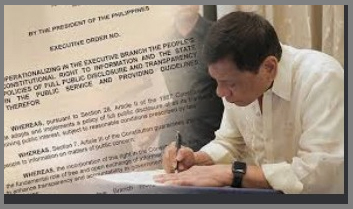FOI executive order: Can it overcome secrecy, corruption?
FOI, access to information

FOI executive order: Can it overcome secrecy, corruption?
CHERRY ANN T. LIM
July 21,2017
IN the Philippines’ long-running effort to get a freedom of information (FOI) law passed, President Rodrigo Duterte’s decision to move on the matter without Congress seems like a ray of light.
But it remains to be seen whether the executive order he signed on July 23 opening up government records to the public will help, or hurt, the aims of the order.
Eight senators and a congresswoman have filed FOI bills in the 17th Congress. The bills cover the executive, legislative and judiciary branches of government and constitutional bodies, while Duterte’s executive order (EO) covers only the executive branch. But this is better than having no FOI order at all. Or is it?
In her 2007 paper, “Liberating Information: On the need for a Freedom of Information Act in the Philippines,” Isolde Amante, now Sun.Star Cebu editor-in chief, writes about what an ideal FOI law should have.
Citing the international free expression advocacy organization Article 19, Amante lists the international standards for FOI legislation as embodied in nine commonly accepted principles. This is how Duterte’s EO and the pending bills stack up against the principles.
(1) Maximum disclosure: “All information held by public bodies is presumed to be for disclosure, except in very limited circumstances. ‘The state should not require any person requesting information to demonstrate a need for or interest in the information. If a public body does not want to release the information requested, it is for the public body to justify that refusal… not for the individual to justify that request.’”
Duterte’s EO: “There shall be a legal presumption in favor of access to information… No request for information shall be denied unless it clearly falls under any of the exceptions.”
And yet the procedure for filing a request requires the requesting party to indicate “the reason for, or purpose of, the request for information.”
But if a request is denied, the EO says the notice of denial should “clearly set forth the ground… for denial and the circumstances on which the denial is based.”
Bills: The bills carry similar language as the EO, and in some cases, add that in the notice of denial, the available rights of reconsideration or appeal be indicated.
Loren Legarda’s Senate Bill (SB) 248 says if the denial is due to a claimed exception, it shall state clearly “the legitimate aim or interest sought to be protected in the confidentiality, and the facts and circumstances invoked showing the substantial harm to, or frustration of, the legitimate aim or interest that will result in the disclosure of the information requested.”
(2) Limited exceptions: Denials of access to information must meet at least three requirements: a) The information must relate to a legitimate aim listed in the law;
b) Its disclosure threatens substantial harm to that aim; and
c) The harm is greater than the public’s interest in disclosure.
Duterte’s EO: The exceptions are information that falls under the exceptions enshrined in the Constitution, existing law or jurisprudence.
Bills: In addition to information exempted from disclosure by law and the Constitution, the exceptions include information on national security and foreign affairs authorized to be kept secret by an executive order; records of minutes and advice given and opinions expressed during decision-making or policy formulation, invoked by the Chief Executive to be privileged by reason of sensitivity; information on internal and external defense, law enforcement and border control, when it would compromise military or law enforcement operations, endanger the safety of any individual, or deprive a person of a right to a fair trial; drafts of orders, resolutions, decisions, memoranda, or audit reports; information obtained by Congress in executive session; personal information of a person if release would constitute unwarranted invasion of privacy; trade secrets and commercial or financial information that would seriously prejudice competition; information classified as privileged communications in legal proceedings.
What the bills have that the EO doesn’t have is a waiver by government bodies of the exceptions if public interest in the disclosure outweighs the harm to the interest sought to be protected by the exception. Sonny Angara’s SB 315 also allows a requester to overcome an exception if he can prove the same before the Ombudsman or court.

All information held by public bodies is presumed to be for disclosure, except in very limited circumstances.” – Isolde Amante, editor-in-chief of Sun.Star Cebu
(3) Obligation to publish: “Beyond accepting and acting on requests for information, public bodies must publish and disseminate information, including its operations, finances, procedures for filing complaints or requests, and decisions.”
Duterte’s EO: Every government office must prepare within 120 calendar days its FOI manual (presumed to be disclosed) indicating the place where the public can submit requests, the persons tasked to receive requests, and the procedure for the filing and processing of requests.
The EO does not order any other mandatory disclosures. For instance, public officials are only “reminded” to make their Statement of Assets, Liabilities and Net Worth (SALN) available for scrutiny, subject to exceptions enshrined in the Constitution, laws and jurisprudence. This means if no one requests the SALN, the public official is not mandated to disclose it.
Bills: House Bill 1855 by Laguna 3rd District Rep. Sol Aragones and four Senate bills mandate the annual disclosure of the SALN of the country’s top officials–the President and Vice President; Members of the Cabinet, Congress, Constitutional bodies; highranking officers of the armed forces, and Justices of the Supreme Court, on their official websites.
In addition, the bills require government agencies to post on their websites, for updating every 15 or 30 days, their budgets, collections and disbursements, Internal Revenue Allotment utilization, procurement plans and lists, bid results, procurement contracts, loans, guarantees and trade agreements, among other things. Some bills include the SALNs of their public officers for mandatory disclosure in the agencies’ websites.
The agencies are given two to three years to come up with compliant websites.
(4) Promotion of open government: The law must include provisions for public education on how the right to information can be exercised, and training to overcome the culture of secrecy among public officials.
Duterte’s EO: There is no provision for this.
Bills: The House bill and four Senate bills provide for the integration of FOI education in the elementary and secondary education. The House bill and some Senate bills also require government agencies to make a yearly report on the number of FOI requests they received, processed, granted and denied, and of appeals made.
All the bills also provide for the training of public officials to improve awareness on the people’s right to information, and to learn updated practices in information disclosure, records maintenance and archiving.
(5) Costs “should not deter requests,” and those requests made for public interest may be charged lower fees than those arising from commercial interests.
Duterte’s EO: Reasonable fees may be charged to reimburse costs of reproduction of the information. Fees shall not be onerous.
Bills: The bills provide for “reasonable fees” for reproduction and transmission of the information, and some provide for a waiver of the fees for indigents or if the costs are negligible.
(6) Processes to facilitate access: Requests for information and appeals in case of denial of access should be processed quickly and fairly.
Duterte’s EO requires requesting parties to provide proof of their identification along with the information they request. It gives government offices 15 working days to respond to a request. The period to respond may be extended if the information requires extensive search of government records or if fortuitous events occur. The extension is up to 20 working days, unless exceptional circumstances warrant a longer period. Failure to notify the requesting party of the action made on the request within 15 working days shall be deemed a denial of the request.
Appeals must be filed “within 15 calendar days from the notice of denial or from the lapse of the relevant period to respond to the request.” The appeal shall be decided by the person or office next higher in authority within 30 working days from the filing of the written appeal, failure of which shall mean the denial of the appeal. When administrative appeals are exhausted, the requesting party can go to court.
Bills: They also require proof of identification, and give government from seven to 15 days to respond to requests. Appeals must be resolved in five to 15days. And there is an added option to go to the Office of the Ombudsman, instead of just the proper court, to direct the offending government agency to afford access to the information sought. Some bills give the Ombudsman 60 days to resolve a complaint.
Is this quick and fair? The requirement of identification adds a layer of bureaucracy that journalists today don’t have to suffer. And while setting a time period within which to respond to requests may seem better than waiting indefinitely for a reply, the time period also makes it easier for government offices to deny requests for information, as inaction by them within this period is deemed a denial of the request for information, or of an appeal.
Many government offices currently give journalists the information they seek way past a month, and yet silence from them during this period has never been construed as a denial of the request. So the EO in fact curtails the access to information that journalists now enjoy.
Article 19 also says:
(7) Meetings by public bodies are presumed open, so the public must be given adequate notice of these meetings; otherwise, the reason for barring the public must be explained;
(8) Other laws should be interpreted or amended to conform to disclosure requirements in FOI laws; and
(9) Whistleblowers who release information on wrongdoings should be “protected from legal, administrative or work-related sanctions,” Amante writes.
She adds that lawyer Nepomuceno Malaluan of the Access to Information Network points out the need to incorporate in an FOI law the creation of “an Information Commission whose primary purpose would be to ensure that the right to information is enforced” to give citizens an option other than costly and drawn-out litigation.
Duterte’s EO and the bills are silent on all these.
Malaluan also said the FOI law “must take into account advances in technology” and accept requests transmitted by electronic means to allow citizens in the provinces to access information stored in central offices in the capital. And on this count, the bills deliver because they allow requests to be made “personally, by mail or through electronic means” and requesters to specify their preferred means of receiving the information they seek.
So the bills show more promise than the EO, especially if the provision on the non-response of government to be construed as denial of request were stricken from the bills.
But then again, the nine bills now pending in Congress might still go the way of the other FOI bills filed since the post-Edsa 1987 Constitution strengthened guarantees on the people’s right to information: nowhere.
List of bills pending in the 17th Congress
✓House Bill 1855 by Laguna 3rd District Rep. Sol Aragones
✓ Senate Bill 54 by Francis Pangilinan
✓ Senate Bill 72 by Alan Peter Cayetano
✓ Senate Bill 82 by Francis “Chiz” Escudero
✓ Senate Bill 94 by Antonio Trillanes IV
✓ Senate Bill 149 by Joseph Victor G. Ejercito
✓ Senate Bill 159 by Grace Poe
✓ Senate Bill 248 by Loren Legarda
✓ Senate Bill 315 by Sonny Angara
166 exceptions to Duterte’s executive order
For review by the Office of Deputy Executive Secretary for Legislative Affairs are 166 exceptions to President Duterte’s executive order submitted by the Department of Justice and the Office of the Solicitor General. Among them:
✓ Information that puts at risk national security, defense of the state, military or police operations, border security, and lives and safety of individuals and witnesses
✓ Foreign affairs matters that could affect bilateral or multilateral negotiations
✓ Statements of Assets, Liabilities and Net Worth of officials, if the purpose of the request is contrary to morals or public policy, or for commercial purposes other than public dissemination by news media
✓ Lists and detailed reports on how congressional funds were disbursed
✓ Investigations by public authorities.
✓ Trade secrets, confidential commercial and financial data, and business data compiled by government on operations of private firms
✓ Anti-money laundering and related transaction reports
✓ Information obtained by Congress in executive session and considered privileged communications in legal proceedings or the Rules of Court
✓ Information on the President’s appointing, pardoning and diplomatic powers
✓ School, medical, birth and employment records; banking transactions and personal and sensitive information on persons that would result in invasion of privacy. 
